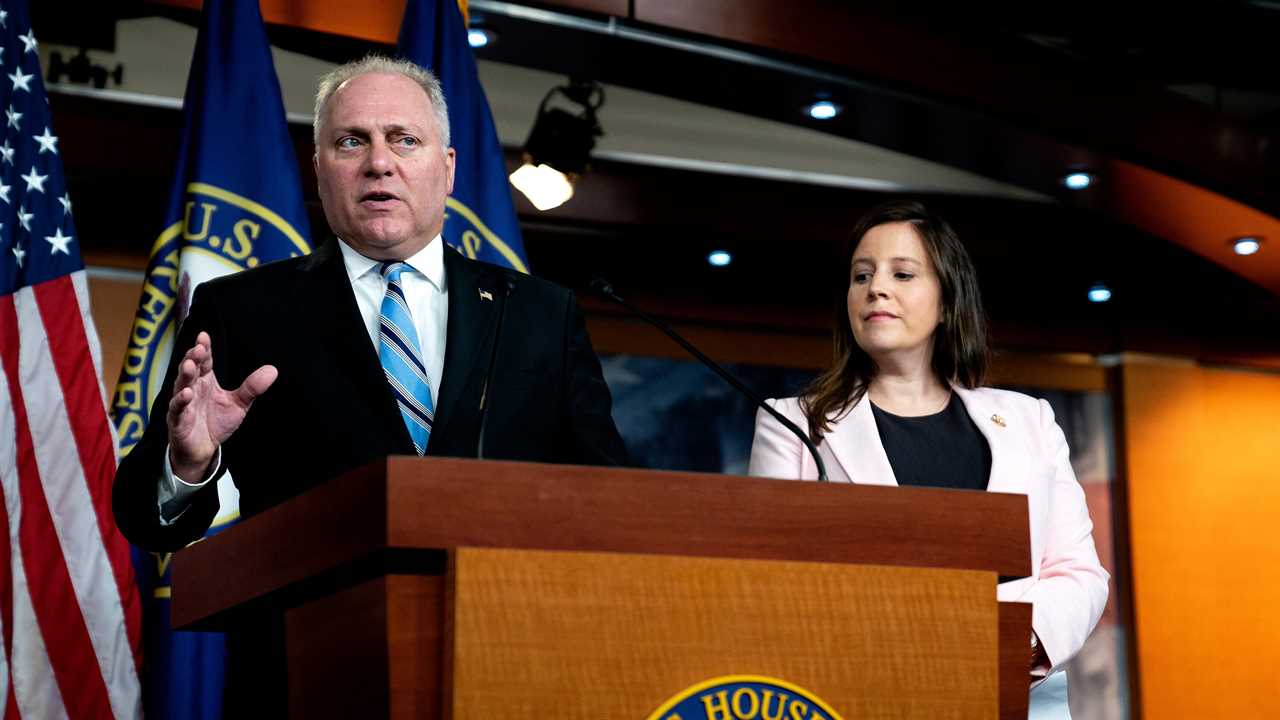
The coronavirus pandemic is receding. The economy is gradually climbing back. And according to recent surveys, a wide majority of Americans is feeling optimistic about the future.
On Thursday, the Consumer Comfort Index, a polling measure of Americans’ confidence in the economy, hit its highest level since before the pandemic.
But as our congressional correspondent Jonathan Weisman points out in a new article, House Republicans are pushing a much different interpretation of what’s going on. During a news conference they held on Tuesday, the buzzword was “crisis”: It was used about once every minute for nearly half an hour. Republican leaders are arguing that the economy, national security, the U.S.-Mexico border and more are all in peril.
Such arguments are often used by the party out of power. But with Republicans leaning so hard into the message, the question is whether it will resonate enough to throw a wrench in President Biden’s efforts to advance his sweeping agenda — and if, over a year from now, it will have enough staying power to rile up the Republican Party’s base in the midterm elections.
For his article, Jonathan spoke to a number of Republican elected officials, among others, about the G.O.P.’s new message. I caught up with him on Thursday to hear about what he’d learned.
Hi Jonathan. As you outline in your article, House Republicans have begun to push a narrative about the country being in “crisis.” All kinds of crises, in fact. But polls seem to suggest that Americans’ spirits are rising as the pandemic recedes. Why this message from the G.O.P., and why now?
It’s true that they don’t seem to be capturing the nation’s general postpandemic joy. But core Republican voters are apparently feeling unsettled by all this Bidenism — a huge pandemic relief bill; proposed social and infrastructure spending bills measuring in the trillions, not billions; about-faces on countless Trump policies.
Republicans in Washington want to push that discomfort into panic mode, in hopes that the agitation spreads beyond the base to generalized anger in next year’s midterm season. Hence the mantra: crisis, crisis, crisis.
How much would you say that the catastrophe narrative is a product of today’s polarized media landscape? Many of the arguments outlined in your piece sound like red meat for the Republican base — the kinds of folks who might click on a web ad bashing Biden, or donate to Representative Marjorie Taylor Greene — but it seems less certain that they would resonate with middle-of-the-road voters. Is that a concern for Republican leaders?
Oh, it is about the polarized media landscape. Republican leaders will see their narrative echoed on Fox, One America News, Newsmax and Grandpa’s Facebook feed, and declare victory. They might not even notice that it is not getting much traction elsewhere.
But for them, that’s OK. Historically, the party out of power in the White House scores big in midterm elections. That party’s base voters are usually smarting over their defeat in the presidential election and have something to prove. Voters for the party in the White House feel secure that their guy will stop anything awful from happening, and they relax.
So turnout favors those out of power, and in this case, those out of power in Washington have enough leverage in key states — think Georgia, Texas and Florida — to redraw congressional districts in their favor. Republicans just need to keep their voters angry, agitated and ready to vote.
The most prominent recent example of “crisis” messaging came on the immigration front. Soon after Biden took office, Republican officials and conservative commentators began hammering him for what they branded the “border crisis.” How effective have G.O.P. strategists found that message to be, and is it affecting their thinking going forward?
One politician’s crisis is another politician’s bad situation. The border is at the very least a bad situation, with apprehensions of people crossing illegally at levels unseen since Bill Clinton was president.
The problem for Republicans is that the bad optics have faded, with the Biden administration’s diligent efforts to get unaccompanied children out of Border Patrol jails and into less visible shelters run by the Department of Health and Human Services. And unless you’re living near the border, you’re not seeing the “crisis.” So Republicans have moved on, throwing more visible spaghetti on the wall, like rising prices and labor shortages, to see what sticks.
Perhaps the biggest political crisis of the past year has been one of Donald Trump’s making: His falsehoods led many of his supporters to lose faith in American democracy itself, with some even attacking the Capitol on Jan. 6. Today, G.O.P. legislators across the country are still re-litigating the election, passing voting restrictions and leading sometimes-chaotic recounts of the 2020 election results. Is there any concern among Republicans that sounding the “crisis” alarm could lead voters to think a little bit too hard about who is the real source of the problem?
Good question. But if there is concern about that, they aren’t letting on. You could see much of the outrage machine’s output as a multipronged diversion from the crisis of faith in democracy.
The other actual crisis is a once-in-a-century pandemic that has killed at least 600,000 people in the U.S. The effort to spin up outrage over the Wuhan lab-leak theory — to blame China entirely for all of those deaths — is clearly an effort to try to make Americans forgive Trump for his mishandling of the coronavirus by convincing them it was all a Chinese plot. For the most pro-Trump partisans, that’s a slam dunk. For everyone else, it’s probably a stretch.
Even if it is somehow proved that the coronavirus was invented in a Chinese laboratory, its spread in the United States was far more the fault of Trump than of Xi Jinping.






